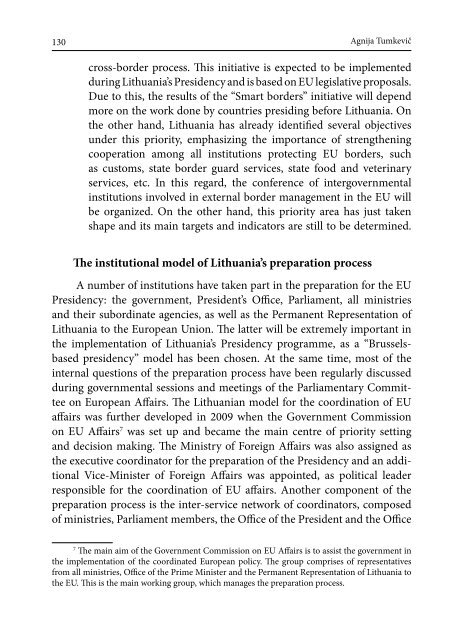es_nr1_2013_netam
es_nr1_2013_netam
es_nr1_2013_netam
You also want an ePaper? Increase the reach of your titles
YUMPU automatically turns print PDFs into web optimized ePapers that Google loves.
130<br />
Agnija Tumkevič<br />
cross-border proc<strong>es</strong>s. This initiative is expected to be implemented<br />
during Lithuania’s Pr<strong>es</strong>idency and is based on EU legislative proposals.<br />
Due to this, the r<strong>es</strong>ults of the “Smart borders” initiative will depend<br />
more on the work done by countri<strong>es</strong> pr<strong>es</strong>iding before Lithuania. On<br />
the other hand, Lithuania has already identified several objectiv<strong>es</strong><br />
under this priority, emphasizing the importance of strengthening<br />
cooperation among all institutions protecting EU borders, such<br />
as customs, state border guard servic<strong>es</strong>, state food and veterinary<br />
servic<strong>es</strong>, etc. In this regard, the conference of intergovernmental<br />
institutions involved in external border management in the EU will<br />
be organized. On the other hand, this priority area has just taken<br />
shape and its main targets and indicators are still to be determined.<br />
The institutional model of Lithuania’s preparation proc<strong>es</strong>s<br />
A number of institutions have taken part in the preparation for the EU<br />
Pr<strong>es</strong>idency: the government, Pr<strong>es</strong>ident’s Office, Parliament, all ministri<strong>es</strong><br />
and their subordinate agenci<strong>es</strong>, as well as the Permanent Repr<strong>es</strong>entation of<br />
Lithuania to the European Union. The latter will be extremely important in<br />
the implementation of Lithuania’s Pr<strong>es</strong>idency programme, as a “Brusselsbased<br />
pr<strong>es</strong>idency” model has been chosen. At the same time, most of the<br />
internal qu<strong>es</strong>tions of the preparation proc<strong>es</strong>s have been regularly discussed<br />
during governmental s<strong>es</strong>sions and meetings of the Parliamentary committee<br />
on European Affairs. The Lithuanian model for the coordination of EU<br />
affairs was further developed in 2009 when the Government commission<br />
on EU Affairs 7 was set up and became the main centre of priority setting<br />
and decision making. The Ministry of Foreign Affairs was also assigned as<br />
the executive coordinator for the preparation of the Pr<strong>es</strong>idency and an additional<br />
Vice-Minister of Foreign Affairs was appointed, as political leader<br />
r<strong>es</strong>ponsible for the coordination of EU affairs. Another component of the<br />
preparation proc<strong>es</strong>s is the inter-service network of coordinators, composed<br />
of ministri<strong>es</strong>, Parliament members, the Office of the Pr<strong>es</strong>ident and the Office<br />
7 The main aim of the Government commission on EU Affairs is to assist the government in<br />
the implementation of the coordinated European policy. The group compris<strong>es</strong> of repr<strong>es</strong>entativ<strong>es</strong><br />
from all ministri<strong>es</strong>, Office of the Prime Minister and the Permanent Repr<strong>es</strong>entation of Lithuania to<br />
the EU. This is the main working group, which manag<strong>es</strong> the preparation proc<strong>es</strong>s.


